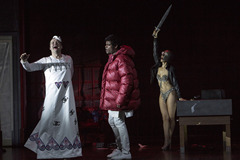| Opera Reviews | 25 April 2024 |
The Bassarids returns to Salzburg in triumphby Moore Parker |
|
| Henze: The Bassarids Salzburg Festival 19 August 2018 |
|
|
The Salzburg Festival hosted the work’s world premiere in 1966. A German-language version was chosen at the time, and for the current production the concept was again debated before the choice fell to the original English, as well as to the work’s unadulterated version complete with Prologue, Intermezzo, and the Calliope scene. The composer, who was highly political and - as such - not always in favour, regarded The Bassarids as his most important stage work - and one pointing the way toward the vital socio-political developments of 1968. Arguments can easily sway both ways as to presenting a shortened version (undisturbed by an interval) or granting the piece its intended form - which, in an event as important as this, is unquestionably justified. The vast breadth of the Felsenreitschule stage (with its ideal natural stonework setting) was divided into four sections by open metalwork partitions (sets and costumes Malgorzata Szczęśniak) which succinctly help the eye with logistical challenges. At times live camerawork projects elements - and indeed entire scenes - (such as the Calliope, for Dionysus’ and Pentheus’ benefit as independent onlookers) in magnified version. For the audience, a brief time delay in video projection creates an interestingly-obscure, distorted effect - almost echoing the technique familiar in the paintings of Francis Bacon. As Dionysus spins his web, decadence in its all-encompassing forms imbues and conquers. After achieving his destructive goal, Dionysus passes from room to room pouring petrol from a large canister. More chilling than any dramatic inferno might be, in the subsequent stage blackout the perpetrator simply ignites a cigarette lighter - and a minute single flame suffices to convey the single gesture’s potential power and significance. The production brings together an excellent cast, ideally balanced in all respects, and consummate in focus and character definition - with the only slight reservation falling to the huge (vocally excellent) chorus members who appear too static, too often, for the salacious activities which unfold during the course of the evening. As Dionysus, Sean Panikkar (covert in a white hoodie jacket for much of the action, before triumphantly donning Pentheus’ “cloak” (a red-stepped anorak) brought insolent youthful acrimony in the form of an exotic anti-god - at times contrasting a knock-kneed shuffle with a mercurial sprint as he wove his web of intrigue. Robust in tone (if somewhat uneven in production and subject to wayward vibrato and occasional distress) Panikkar’s tenor is ideal for this kind of Fach. Russell Braun’s Pentheus boasted an immaculately-produced high-lying baritone, exemplary enunciation, and riveting dramatic focus throughout - well-complimented by Willard White’s genteel Cadmus, which was eloquent in delivery and pointed in text. The remaining soloists were a touch under par in diction, making the projected proscenium English and German titles a necessity (and obviously detracting from their otherwise powerful readings). Anna Maria Dur gave a sympathetic and full-toned Beroe to underscore the four other leads, who all undertook double roles. With his searing tenor, Nikolai Schukoff (incidentally, a former Dionysus in an earlier Munich production) switched most effectively between Tiresias and the decadent Calliope, while Tanja Ariane Baumgartner blossomed grandly during the course of the evening in her dual function as Agave/Venus. Her rich warm mezzo and dramatic flair whets the appetite for recent additions to her vocal stable such as Ortrud, Kostelnička, and Kundry. Blond and strikingly slinky, Vera-Lotte Böcker rode Henze’s demanding tessitura and (at times) testing orchestration fearlessly with her clarion soprano (Autonoe and Proserpine) and last but not least, Károly Szemerédy well contrasted his hectored Captain with the sex-charged Adonis, while displaying a well-tuned baritone of decided potential. Rosalba Guerrero Torres ranks with the vocal leads for her contribution as an extraordinarily dynamic solo dancer, as well as acting choreographer of the group of four - who together were fundamental in establishing the orgiastic energy essential to the piece. The Bassarids may not enter the popular ranks of standard operatic repertoire, but this production will certainly help it on its way to well-deserved respect as one of its century’s milestones.
|
|
| Text ©
Moore Parker Photo © Salzburger Festspiele / Bernd Uhlig |

 Monumental in all respects, multi-layered in concept, and timeless in its message, the political relevance prevalent in Krzysztof Warlikowski’s (making his Salzburg Festival debut) reading highlights the perennial themes in Euripides’ Bacchae - set upon Henze’s request by W.H. Auden and Chester Kallman to become the libretto for The Bassarids. Here, neutrally updated and subtly understated in setting, the piece illustrates the ever-present danger of human gullibility paired with the power of manipulation - and the resulting potential catastrophe. Fake News abounds!
Monumental in all respects, multi-layered in concept, and timeless in its message, the political relevance prevalent in Krzysztof Warlikowski’s (making his Salzburg Festival debut) reading highlights the perennial themes in Euripides’ Bacchae - set upon Henze’s request by W.H. Auden and Chester Kallman to become the libretto for The Bassarids. Here, neutrally updated and subtly understated in setting, the piece illustrates the ever-present danger of human gullibility paired with the power of manipulation - and the resulting potential catastrophe. Fake News abounds!





